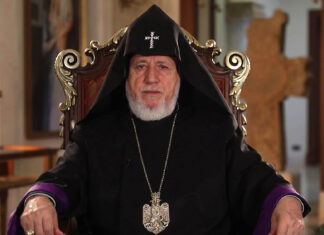Azerbaijan preplanned the ethnic cleansing of Nagorno-Karabakh’s indigenous Christian population. With proceeds from BP’s multibillion Caspian deal and international assistance, President Ilham Aliyev purchased drones and artillery from Israel and Turkey to give Azerbaijan a military edge over Armenia. He feigned commitment to Minsk Group diplomacy to cover his intentions. Prior to the outbreak of the second Nagorno-Karabakh War, Aliyev even initiated several border skirmishes to test the waters, confirm Azerbaijan’s readiness and probe Armenian weakness.
Azerbaijan quickly determined that the West was a paper tiger and so Aliyev viewed an attack on Nagorno-Karabakh not as a gamble, but rather a sure thing. So, on September 27, 2020, Azerbaijan launched full-scale, multi-front surprise attack timed to coincide with the centenary of the Ottoman invasion of independent Armenia.
In hindsight, the November 9, 2020 ceasefire had nothing to do with recommitment to resolve the Nagorno-Karabakh dispute peacefully. For Aliyev, it was about rearmament and resupply. President Vladimir Putin meanwhile hoped the pause would lead outraged Armenians to reverse the 2018 revolution and end Armenia’s westward tilt.
When 13 months ago, Aliyev renewed his campaign of aggression, he took a page from Putin’s playbook. Just as Russia invaded Crimea with men lacking uniforms or insignia to obfuscate and confuse the West, so too did Aliyev seek to confuse the West. Rather than men in black, Aliyev used self-described environmentalists to block the Lachin corridor, the ceasefire-designated lifeline for Nagorno-Karabakh’s Armenians.
In press interviews with friendly Azerbaijani or Turkish journalists, the so-called environmentalists declared themselves to be independent activists motivated by the pollution caused by Armenian goldmining. That some Washington think tank analysts accepted such nonsense at face value shows either naïveté or willingness to amplify Azerbaijani propaganda as unregistered foreign agents. After all, according to Freedom House, Azerbaijan is among the world’s most autocratic states. Independent civil society does not exist. Azerbaijan’s Freedom House civil liberties score falls below the Hamas-controlled Gaza Strip and Myanmar (Burma) under the military junta. CivilNet, an independent Armenian platform dedicated to encouraging liberalism, transparency, and democracy, found that many of the so-called environmental activists were actually state officials closely tied to Aliyev’s inner-circle. They served their purpose. They initiated the starvation of Nagorno-Karabakh’s Christians and normalized the blockade. Ultimately, they set the stage for Aliyev to complete his conquest.
The irony, however, is that while Aliyev’s environmentalists mobilized for an imaginary crisis, they are absent for the real environmental crises Azerbaijan faces. Consider, for example, goldmines controlled by Leyla Aliyeva, Ilham Aliyev’s eldest daughter and Arzu Aliyeva, his younger legitimate daughter.








